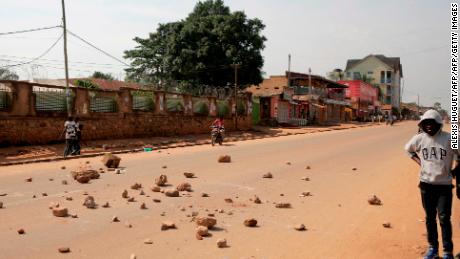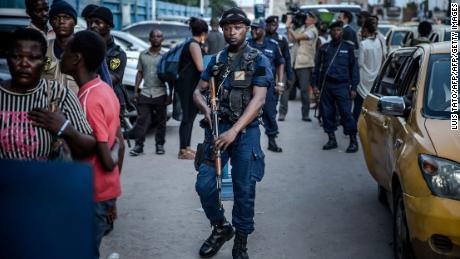Voters lined up to pick a successor to President Joseph Kabila, who has ruled the central African country since 2001. Sunday's vote would have marked the country's first-ever democratic transfer of power, but an electoral commission's decision to delay voting in three opposition strongholds has all but guaranteed contested results.Kabila has ruled Congo for nearly two decades. He came to power at 29 and amid crisis after the assassination of his father in 2001.Although his second term ended in 2016, Kabila has refused to step down, clinging to power by violently cracking down on protests and suppressing the opposition. It was a surprise when the strongman announced in August that he would not seek reelection.On Sunday, Kabila promised the elections "will definitely be free and fair," adding his main concern was "very heavy rain" in the capital city of Kinshasa.Kabila's former interior minister Emmanuel Ramazani Shadary as well as some 20 opposition candidates are vying to replace him. Of the opposition candidates, only two are considered to have a serious chance of winning the presidency, former ExxonMobil manager Martin Fayulu and Felix Tshisekedi, president of the largest opposition party.The results from Sunday's votes are expected to be announced on January 15, 2019.
Delays and protests
Sunday's vote follows a violent campaign season marked by conflict between militant groups and government forces.Violent protests erupted in recent days after the Independent National Election Commission announced on Wednesday that voters in the cities of Beni, Butembo and Yumbi, opposition strongholds, would not cast their ballots until March because of "the persistence of the Ebola disease" and "the threat of terrorism."Anti-riot police officers were deployed in response to street protests in Goma and Butembo, two cities surrounding Beni, as angry demonstrators, mainly supporters of opposition parties, took to the streets to protest their exclusion from the polls. Police fired tear gas to disperse dozens of protesters who blocked roads and burned tires in Beni. Protesters also barricaded major roads by using stones to block vehicles.The protests continued on Sunday, as demonstrators in Beni decried the decision to postpone voting due to the Ebola outbreak and held their own makeshift vote."We've decided that it was better to organize our own elections here locally in Beni, to show the world that we are able to do it too," resident Christian Kaniangambi told AFP. "We've heard excuses saying Ebola and unrest were the reasons why it wouldn't happen here. As you can see, we are holding these elections." "We've washed our hands," added Kitonga Benshirak, another Beni resident. "We've used sanitizer to protect ourselves. If Ebola is the only reason they can find to rule out our vote, then we will see how many people are infected with Ebola after this vote."  Supporters of Fayulu marched to election commission headquarters in Kinshasa on Thursday.Fayulu had earlier condemned the electoral commission's decision in a post on Twitter, calling it "another strategy to turn the truth out of the ballot box." But a spokesman for the electoral body said that the decision to delay voting in those areas was legal.
Supporters of Fayulu marched to election commission headquarters in Kinshasa on Thursday.Fayulu had earlier condemned the electoral commission's decision in a post on Twitter, calling it "another strategy to turn the truth out of the ballot box." But a spokesman for the electoral body said that the decision to delay voting in those areas was legal. The long-awaited election had been slated for December 23, but the electoral commission delayed voting for a week amid political turmoil and one of the deadliest Ebola outbreaks in history.The commissioners blamed the delay, in part, on a massive fire that engulfed a warehouse housing electoral materials in Kinshasa. The blaze destroyed thousands of voting machines — about 80% of the city's stock.
The long-awaited election had been slated for December 23, but the electoral commission delayed voting for a week amid political turmoil and one of the deadliest Ebola outbreaks in history.The commissioners blamed the delay, in part, on a massive fire that engulfed a warehouse housing electoral materials in Kinshasa. The blaze destroyed thousands of voting machines — about 80% of the city's stock.
Journalist Patrick Felix Abely reported from Goma and CNN's Bukola Adebayo from Lagos, Nigeria. CNN's Dakin Andone and Katie Polglase contributed to this report.
Original Article
[contf]
[contfnew]

CNN
[contfnewc]
[contfnewc]








